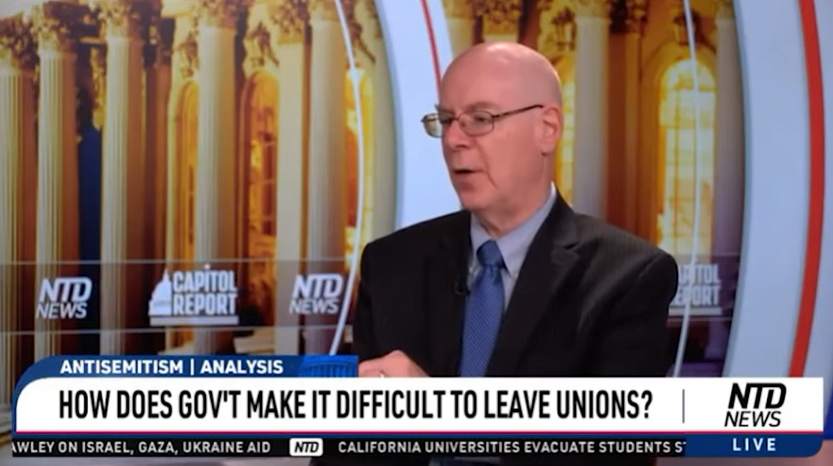Jewish MIT Graduate Students Force Anti-Israel Union to Abandon Discriminatory Demands for Dues Payment
Settlement includes requirement that GSU union inform 3,000+ students of their right to refrain from paying for radical union political activities
Boston, MA (August 21, 2024) – Several Jewish graduate students at the Massachusetts Institute of Technology (MIT) have prevailed in their legal cases to cut off financial support to the MIT Graduate Student Union (GSU), an affiliate of the United Electrical (UE) union. The students, all of whom received free legal assistance from National Right to Work Foundation staff attorneys, objected to GSU union officials’ anti-Israel activities, particularly their support for the Boycott, Divestment, Sanctions (BDS) movement.
Because Massachusetts lacks Right to Work protections that make union membership and financial support voluntary, union officials at unionized private colleges like MIT can force graduate students to financially support a union under threat of losing their academic positions and work. However, this power is subject to limitations under federal anti-discrimination law and some Supreme Court decisions.
Foundation staff attorneys litigated federal charges at the Equal Employment Opportunity Commission (EEOC) in March for William Sussman, Joshua Fried, Akiva Gordon, Adina Bechhofer, and Tamar Kadosh Zhitomirsky, each of which stated that the union had demanded full dues payments even after they had each stated their religious objection to funding the union and asked for an accommodation as per Title VII of the Civil Rights Act of 1964. Such accommodations vary, but often take the form of letting the objector divert the dues from the offensive union to a 501(c)(3) charity instead.
Shortly after those filings, Foundation staff attorneys also filed federal unfair labor practice charges at the National Labor Relations Board (NLRB) for Katerina Boukin, who objected on political grounds to the GSU’s ideological activity and sought to exercise her rights under the Foundation-won Communications Workers of America v. Beck Supreme Court decision. In Beck, the Court ruled that union officials cannot force those who opt out of formal union membership (like Boukin) to pay dues or fees for union expenses not directly related to collective bargaining, even in a non-Right to Work state. GSU bosses denied Boukin’s Beck request on the specious grounds that she had missed a short union-concocted “window period” in which such an objection would be accepted.
Settlement Blocks Union Bosses from Using Student Money to Support Extremism
The students have now won a favorable NLRB settlement, and a favorable outcome of the EEOC charges, that fully vindicate their rights. The students who voiced religious objections (Sussman, Fried, Gordon, Bechhofer, and Zhitomirsky) have obtained accommodations under which they will pay no money to the union and will instead pay money to charities of their choice, despite initial pushback from union bosses. The charities include American Friends of Magen David Adom and American Friends of Leket.
Foundation attorneys scored for Katerina Boukin a settlement that will require GSU bosses to inform the entire MIT graduate student body of their rights to invoke the Beck decision. GSU bosses must declare by email that they will not restrict the ability of those who resign their union memberships to cut off dues payments for political expenses and pay a reduced amount to the union. This email notice will go out to approximately 3,000 MIT students.
The Jewish students’ efforts to assert their rights put on display the radicalism of GSU union officials. The students who asserted religious objections to supporting the union initially received form letters as responses to their requests, which callously claimed that “no principles, teachings or tenets of Judaism prohibit membership in or the payment of dues or fees to a labor union” and that no religious conflict existed because the founder of GSU’s parent union was himself Jewish. Through the Foundation-backed litigation, the students’ religious objections to supporting GSU were accommodated.
MIT Students Expose GSU Misdeeds to Congress & Nation
Both Will Sussman and Katerina Boukin publicly commented on how the GSU union’s public image was synonymous with political extremism and had little to do with academics. Boukin stated that she was deeply offended by the union’s “opposition to Israel and promotion of Leninist-Marxist global revolution” and that “[t]he GSU’s political agenda has nothing to do with my research as a graduate student at MIT, or the relationships I have with my professors and the university administration, yet outrageously they demand I fund their radical ideology.”
In July, Will Sussman appeared before the U.S. House Committee on Education and the Workforce to reveal even more details about his and his colleagues’ distressing experience with the GSU union. As Sussman testified, after the October 7 attacks on Israel, GSU union representatives voiced support for Hamas’ bloody “rebellion” and the GSU Vice President was even arrested for her behavior at an anti-Israel protest. “She was banned from campus but remains on [dues-funded] paid ‘union leave,’” Sussman stated.
“The Foundation-backed MIT graduate students who fought these legal battles have earned well-deserved victories. But defending basic free association rights shouldn’t require such lengthy litigation, and meaningful reforms are necessary to ensure union support is truly voluntary,” commented National Right to Work Foundation President Mark Mix. “Forcing GSU union officials to abandon their blatantly discriminatory dues practices is only the tip of the iceberg: Because Massachusetts lacks Right to Work protections, GSU still has the power to force the vast majority of MIT graduate students to subsidize some portion of their activities.
“Foundation attorneys are continuing to provide legal aid for all those who challenge the imposition of radical union agendas at places such as the University of Chicago, Dartmouth, and Johns Hopkins, and they are doing so for adherents of both Judaism and Christianity. But this ordeal at MIT should remind lawmakers that all Americans should have a right to protect their money from going to union bosses they don’t support, whether those objections are based on religion, politics, or any other reason,” Mix added.
U.S. House Committee Spotlights Need for Employee Protections Against Forced Funding of Extremist Unions
Jewish MIT graduate student forced to pay dues to anti-Israel GSU union will testify alongside National Right to Work Foundation staff attorney
Washington, DC (July 9, 2024) – Today, Massachusetts Institute of Technology (MIT) Ph.D. student Will Sussman, who is receiving free legal aid from the National Right to Work Foundation in filing federal anti-discrimination charges against union bosses on campus, is testifying before the U.S. House Committee on Education and the Workforce.
Sussman is testifying alongside veteran Foundation staff attorney Glenn Taubman, who is providing free legal representation to Sussman and other MIT graduate students challenging forced-dues demands from the MIT Graduate Student Union (GSU-UE, an affiliate of the United Electrical Workers union).
The hearing, being held by Rep. Bob Good (R-VA) in the Subcommittee on Health, Employment, Labor, and Pensions (HELP), was called to focus on how union bosses have used their government-granted powers to force Jewish and other employees to associate with and fund unions – even as union officials are propping up increasingly radical protests and other objectionable activities on college campuses and workplaces across the country.
Jewish MIT Graduate Student: BDS-Linked Union Refused to Grant Religious Accommodation
Sussman, who is Jewish, objects to the anti-Israel advocacy of the GSU union, including the union’s endorsement of the “Boycott, Divestment and Sanctions” (BDS) movement. He and four other Jewish graduate students sent letters to GSU union officials earlier this year requesting religious accommodations to union dues payment.
Title VII of the Civil Rights Act of 1964 requires union officials to accommodate those that have religious objections to subsidizing union activities; in practice this usually entails letting the student pay an amount equivalent to dues to a charity. However, GSU union officials’ initial response was to brush aside students’ requests, claiming they didn’t understand their own faith and that their objections were actually political and not religious in nature.
“The union denied my request, telling me in a letter that ‘no principles, teachings or tenets of Judaism prohibit membership in or the payment of dues or fees to a labor union,’ that one of UE’s founders was Jewish, and that opposition to BDS isn’t a position I hold for religious reasons. In other words, UE thinks it understands my faith better than I do,” Sussman’s testimony reads.
Sussman is one of six MIT graduate students that Foundation attorneys are representing in federal proceedings against the GSU union.
Biden NLRB Policy Lets Union Officials Seize Control Over Graduate Students
As Foundation attorney Glenn Taubman’s testimony describes, partisan rulings by the National Labor Relations Board (NLRB) have bypassed Congress and given union bosses the ability to seize control over graduate students: “The current travesty of herding graduate students into anti-semitic unions finds its source with the Obama-Biden National Labor Relations Boards, which have by fiat turned graduate students into graduate employees – subject to unionization under the NLRA and, of course, the payment of forced union dues as a condition of their academic careers,” Taubman’s testimony reads.
Giving unions such monopoly bargaining power not only permits union bosses to dictate the conditions of graduate students’ academic work, but also gives them the power to force students to pay dues in states that lack Right to Work laws (like Massachusetts).
Even worse, union bosses are able to conduct disruptive strikes that stunt academic progress and frequently have outrageous political elements that have no connection to academics: For example, the recent strike United Auto Workers (UAW) union officials engineered against the University of California system was designed to defend anti-Israel rioters who were suspended and pressure university administrators into divesting from companies supporting Israel.
“Mr. Sussman’s situation should provide to American legislators a harrowing example of the kind of harm workers experience when union bosses seize monopoly bargaining power and become the mouthpiece for an entire workplace,” commented National Right to Work Foundation President Mark Mix. “The NLRB under Biden and Obama has done even more damage by expanding this coercion into academia, where campus unions have fomented unprecedented division all while threatening dissenting students with the loss of their academic work if they don’t pay up to support radical union activities.”
“National Right to Work legislation would ensure that those trapped under unwanted union influence can protect their hard-earned money from flowing into union bosses’ pockets,” Mix added. “Ultimately, though, no individual should be forced under union bosses’ so-called ‘representation’ against their will, no matter whether the source of their opposition is religious, political, or any other reason.”









